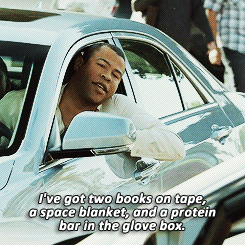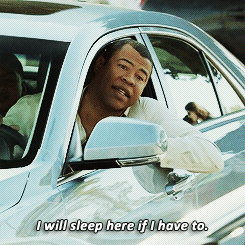 |
| I don't even mind spoilers because I love knowing he'll go bald. |
Minority Report
Weeks like this make it hard to be optimistic about reboot culture. Minority Report isn't bad as far as buddy cop-meets-non-cop procedurals go but it is a show based on a movie based on a short story. The show has big shoes to fill considering the talent that went into those last two. The original story, about cops with future knowledge, is written by sci-fi luminary Phillip K. Dick and the 2002 movie is directed by Steven Spielberg and stars Tom Cruise. With all that in mind, stars Meagan Good and Stark Sands perform admirably and have respectable chemistry. The special effects of the Phillip K. Dickish tech are clean almost to a fault. Even the machine that's supposed to be dangerously out of date looks shiny and new. Although the future isn't exactly "used" and the premise definitely is, Minority Report presents an interesting enough sci-fi universe to warrant a second viewing. Also, Nick Zano plays a sleazy seer, which could be fun.
 |
| Fox |
Mad Men threat level: 5/10
Life in Pieces
 |
| This is from Modern Family. It really doesn't matter. |
Mad Men threat level: 4/10
Blindspot
I've been intrigued with Jamie Alexander since she was Jessi XX on Kyle XY about five years ago. It was nice to see her as Sif in the Thor films but it wasn't enough. Now she might finally get a chance to shine in a lead role in Blindspot. Alexander plays a woman who wakes up in the middle of Times Square with cryptic tattoos all over her body and no memory of anything that happened before that. The series, one of a small few entirely original shows this season, had a lot of hype surrounding it and it delivers on all fronts. It is thoroughly riveting and Alexander is gripping as someone who faces the need to build a life while facing a black hole of a past.
Mad Men threat level: 7/10
The Muppets
"Kermit and Miss Piggy broke up?!" I said in 2011 when Jason Segel's excellent Muppets film came out and Kermit and Miss Piggy were broken up in the beginning. And then they got back together. They're fictional characters who have existed for decades. Anything other than an on-again-off-again relationship would be unfeasible. (I said in 2015 as someone who was very upset in 2011 when Superman and Lois Lane were unmarried [resingled?].) Regardless of the relationship status of glorified gloves, The Muppets is already shaping up to be one of the best comedies on TV. The premise seems a little convoluted at first but it's little more than a modernization of the backstage antics from the classic 70's Muppets Show. Instead of Kermit hosting a variety show, Miss Piggy hosts a late night talk show because she's been breaking glass ceilings with her karate for 40 years and she isn't going to stop now.
Mad Men threat level: 8/10
Scream Queens
Glee had already started going downhill when creator Ryan Murphy's American Horror Story started so I didn't pay it much mind. Then the third season got fans excited, so it spent some time in my Netflix queue before I gave in about a year ago. Now I'm paying attention to Ryan Murphy. It turns out that his love-to-hate characters are more lovable when there's a high possibility that they could die at any moment. Even more so when they're funny and Scream Queens is fortunately hilarious. It's much funnier than it is scary, as one would expect from a network horror-comedy, and that's fine by me as long as Queens keeps up the impeccable pace and the actors keep giving great performances. If Jamie Lee Curtis were having this much fun selling her poop yogurt I might be as regular as Casey Jones in Mussolini's Italy.
 |
| Fox |
Mad Men threat level: 9/10
Limitless
Obviously what the world needed was a TV show based on a mediocre movie that can capitalize on the success of Lucy, all of which are based on a frustratingly inaccurate scientific misconception. To its credit, the Limitless pilot doesn't directly quote the "humans only use 50% of their brain" falsity, instead suggesting the drug that gives its protagonist his super detective powers allows him to use all of his brain at the same time. The pilot is also surprisingly fun, especially star Jake McDorman as the scruffy deadbeat trying to impress his family. It was a good decision to make the show a sequel to the 2011 movie instead of a full reboot. One of the biggest problems with the movie was the way Bradley Cooper's story ended so neatly without any real sacrifice, so it's at least nice to see him continuing to exist. The problem with the show is the looming threat of the buddy cop-meets-non-cop formula, but iZombie has proven that these kinds of shows can be unique and interesting so there's still a small chance for Limitless.
 |
Mad Men threat level: 5/10
Heroes Reborn
I don't remember a whole lot from the original Heroes series, but as far as I can tell the two biggest ways Reborn differentiates itself from its parent is that it's more colorful and has more 9/11 allegory. The first episode starts with a massive explosion that destroys most if not all of Odessa, Texas. It lets us know that this is a different world than the one in the beginning of the first season or even the end. Powered people (evos) are no longer a secret, although they are still in hiding individually because they are being blamed for the explosion in Odessa. They are being hunted and victimized not just by shady organizations but also vigilantes or anyone else with a grudge. Aside from that, the first couple of episodes are mostly about getting to know all the new characters, including an Underground Railroad luchador superhero, a pair of evo hunters, and a girl who is also a video game character. Even without any loyalty to the franchise, the characters are interesting enough to keep me coming back for the rest of this "event miniseries." |
| Global |







